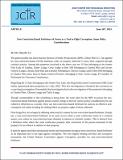Non-Conviction Based Forfeiture of Assets as a Tool to Fight Corruption: Some Policy Considerations
Abstract
Distinct from a forfeiture order, a non-conviction-based forfeiture of an asset occurs when a court confiscates assets of a criminal nature, even where no conviction has been obtained in relation to criminal conduct. The general public has learnt that the Director of Public Prosecutions (DPP), Gilbert Phiri S.C. has applied for non-conviction-based (NCB) forfeiture order of property believed to have been acquired through criminal activity. Among the properties involved in the above case are 15 flats belonging to the former First Lady of Zambia, Esther Lungu; Crest Lodge in Ibex Hill belonging to Charles Phiri and lawyer Chiyeso Lungu; a house, three flats and a poultry belonging to Chiyeso Lungu; land in Ibex Hill belonging to Charles Phiri and a farm in Sinda, Eastern Province, belonging to Hon. Tasila Lungu, PF member of Parliament for Chawama Constituency. Though commendable in that something is being done, the route taken by the DPP, to pursue the non-conviction-based forfeiture against known owners, brings to the fore various policy considerations for our collective reflection as a society. How can non-conviction-based forfeiture be used as an effective anti-corruption tool while avoiding its chilling effect on property rights of those affected?

